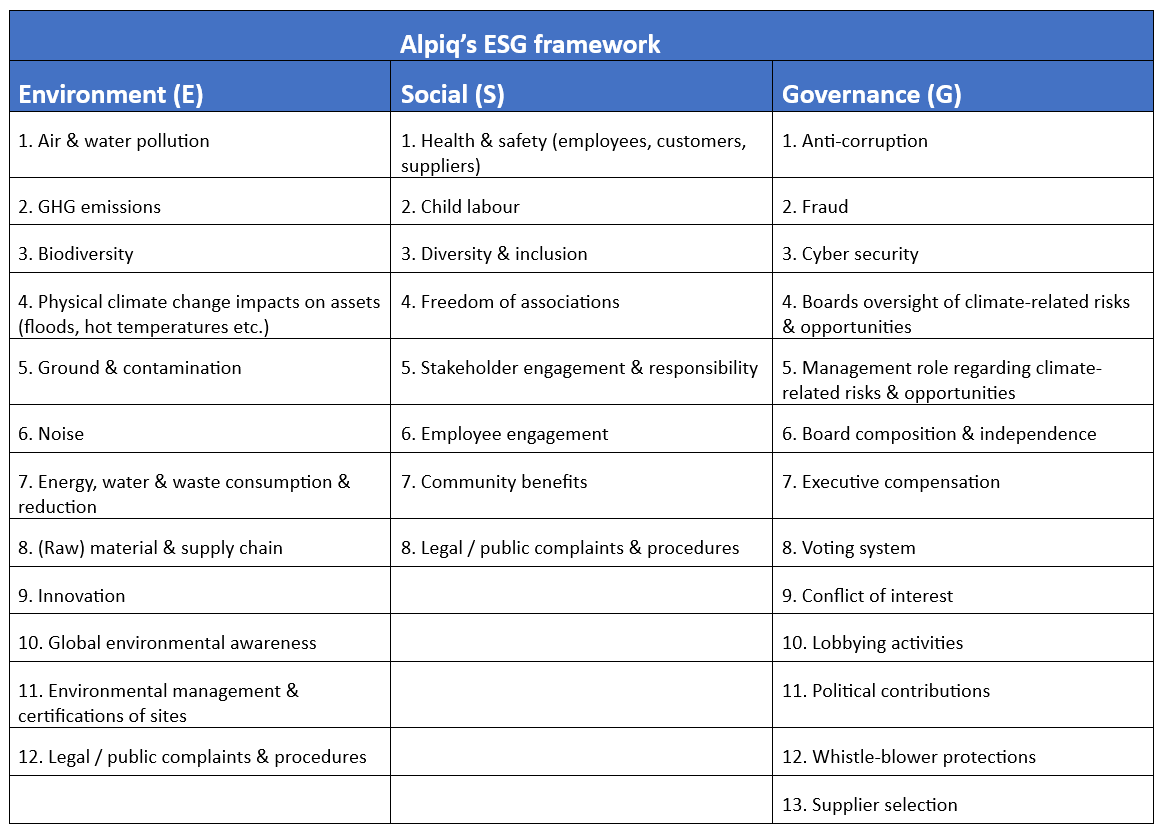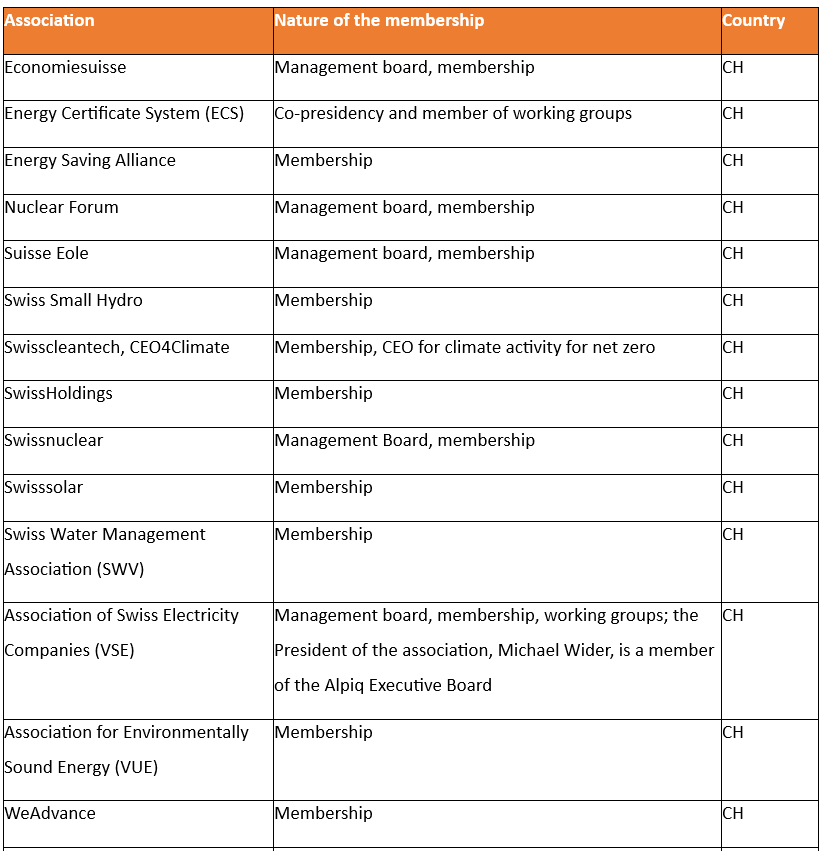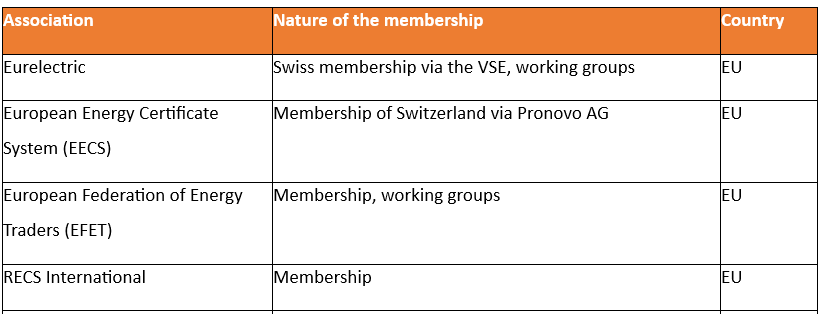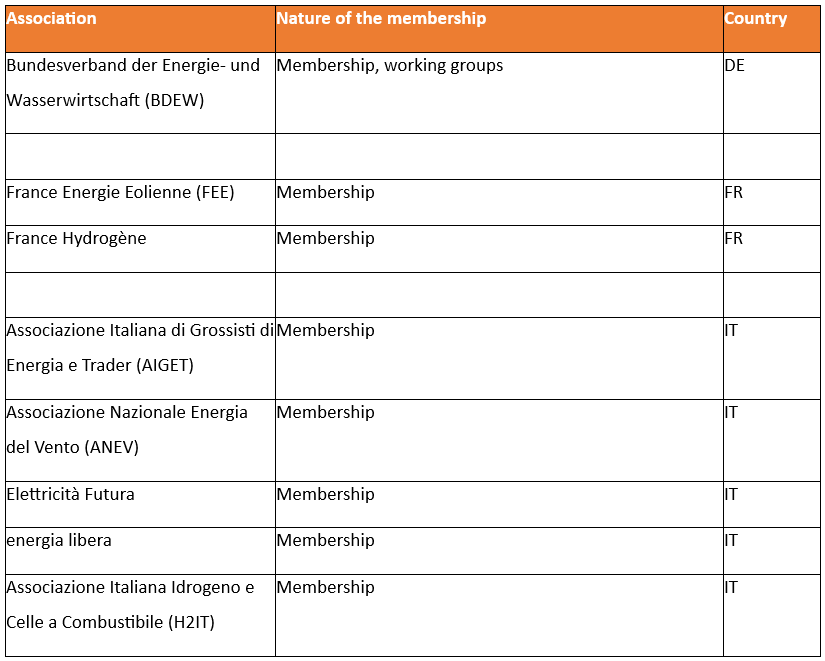Strategy, policies and practices
GRI 2-22: Statement on sustainable development strategy
In the reporting year, Alpiq developed Alpiq’s sustainability framework based on the five sustainable development goals selected and various frameworks available on the market. In the medium term, the aim is to be able to report a significant measured value or corresponding documents for each of the listed factors. Many documents and internal policies already exist today, but they have not been published to date.

However, Alpiq will not only focus on regular reporting, but will also anchor sustainability in the business strategy, determine selected factors as strategic KPIs and establish an active, comprehensive and transparent ESG communication. Decisions will then also be taken with sustainability and ESG compliance in mind. This should ensure that negative impacts on the economy, environment and people can be reduced as comprehensively as possible and opportunities for a positive impact can be identified. In addition, Alpiq will follow in the future the latest “Ordinance on mandatory climate disclosures”, enacted by the Federal Council in November 2022 as well as the “Corporate Sustainability Reporting Directive CSRD” in EU-countries, where Alpiq is present. Data regarding the impact climate change will have on Alpiq and especially on Alpiq’s assets will then be provided.
With large-scale projects such as the Nant de Drance pumped storage power station, which was commissioned in the reporting period and functions like a giant battery, Alpiq is making a significant contribution to a sustainable and climate-friendly security of supply. The planned alpine solar power plant “Gondosolar” and a project near the Grand-Dixence dam, which are also essential for electricity production in the winter months in particular, are further proof of Alpiq’s strategic commitment to sustainable development. An additional statement regarding Alpiq’s sustainable development by our CEO can be found in the introductory chapter.
The biggest challenges Alpiq will face in contributing to a sustainable development in the coming years are external. In particular, regulations and objections that severely delay or even prevent the construction of solar, wind and hydropower plants will have a strong braking effect.
GRI 2-23: Policy commitments
Alpiq’s commitments and values are part of the corporate culture and should at all times form the basis for all decisions and activities with stakeholders such as employees, business partners, investors, financial service providers and the public.
Alpiq’s commitments are guided by various recommendations such as the OECD Guidelines for Responsible Business Conduct, the Swiss Code of Best Practice and the UN Guiding Principles on Business and Human Rights.
Most of the commitments are laid down Alpiq’s Code of Conduct, issued by the Board of Directors, which supports the corporate culture as a binding guideline for ethical behaviour, business integrity and compliance with laws and regulations. The Code of Conduct is part of the employment contract and applies to all employees and mandate holders of the Alpiq Group.
The Code of Conduct is available in nine languages and is supplemented by topic-specific internal policies. All new employees are invited to in-house training on the content of the Code of Conduct when they start work. It includes policies mainly in the fields of anti-corruption, fair competition, prevention of money laundering, protection of data privacy, protection of human rights and avoidance of conflicts of interest. Other commitments, e.g. regarding sustainable protection of the environment, are part of Alpiq’s strategy as laid down in this sustainability report in “GRI 2-22: Statement on sustainable development strategy” and “GRI 2-17: Collective knowledge of the highest governance body”.
However, in order to ensure adherence to the policies described in the Code of Conduct, Alpiq maintains a compliance management system which is based on the traditional pillars of prevention, risk identification and response. Specific fields of these policies are subject to the comprehensive internal company risk analysis and assessment, which is carried out annually by the compliance department.
To ensure continuous monitoring, risks are made transparent at the group level and accessible to management. Necessary improvements of processes and procedures which are established in the frame of the compliance management system, are part of the overall risk assessment and monitoring activities by the Executive Board as described in “GRI 2-12: Role of the highest governance body in overseeing the management of impacts”.
Integrity and compliance with laws are also important when selecting our business partners. A Code of Conduct for Suppliers is an integral contractual component for supplier relationships, in order to ensure compliance with minimum standards. For customers and other business partners, contract clauses and/or agreed business conduct terms may be subject to the relationships. In addition, when dealing with business partners, Alpiq executes the internal company process “know your counterparty”, which describes a part of the due diligence that serves to identify and screen Alpiq business partners. Screening is carried out according to an individual risk-based model taking into account sanctions, embargoes, negative news, identification of politically exposed persons and the perception of corruption in certain countries or industries, etc. Using the database of a leading provider, Alpiq can assess the reputational risk associated with a counterparty or identify potential conflicts of interest. Audited counterparties are monitored by the system for material changes.
Alpiq conducts a personal security clearance on potential employees when recruiting for risk sensitive or leading positions. The clearance is repeated every five years for the employees in question. The personnel security clearance is particularly intended to protect Alpiq from fraud, corruption, money laundering or misappropriation of assets.
Alpiq’s Board of Directors and Executive Board are jointly and regularly committed to the Code of Conduct and Alpiq policies and adherence of it (‘tone at the top’) and therefore emphasis its importance to the sustainable success of the Alpiq Group. In addition, all managers are responsible for implementation of the commitments and corresponding policies in the group companies and always set a good example (‘tone in the middle’).
GRI 2-24: Embedding policy commitments
Policy commitments and any resulting regulations need the approval of the Board of Directors. Any directives based thereon need the approval of the Executive Board.
In the reporting period, the compliance department was announced as a central gatekeeper to ensure quality, consistency and alignment of regulations and directives and to ensure that adequate training and communication measures are conducted.
Adequate communication measures and employee training sessions in various fields are, along with the internal regulations, a key part of the implementation and assurance of Alpiq’s policies. Training content generally covers the defined fields as mentioned in “GRI 2-23: Policy commitments” and is appropriate for the respective target groups. An electronic learning platform greatly supports and facilitates the execution and monitoring of training sessions.
Other stakeholders, such as customers or suppliers are integrated into the policy commitments through contractual obligations.
GRI 2-25: Processes to remediate negative impacts
Our processes ensure that information on negative impacts is escalated to the Board of Directors. For more information on our communication on critical concerns, see “GRI 2-16: Communication of critical concerns”. The Board of Directors decides in which cases remediation on negative impacts is required and gives implementation orders to the Executive Board of Alpiq.
GRI 2-26: Mechanisms for seeking advice and raising concerns
Employees at all levels can seek advice on specific policies as described in “GRI 2-23: Policy commitments” at any time. The internal team of compliance experts and local compliance partners in the respective countries in which Alpiq has employees are available for this purpose.
Alpiq has a great interest in immediate notification if compliance with ethical and lawful conduct in its area of responsibility is not ensured. The compliance reporting office is an essential element for identifying and clarifying misconduct and addressing weaknesses. Alpiq provides various reporting channels for this purpose. In addition to a telephone number and email address set up specifically for this purpose, the compliance reporting office can also be contacted via an online form. The contact details are published in the Alpiq Code of Conduct, on the Alpiq intranet and on the official Alpiq website. The compliance reporting office is mainly aimed at employees but is generally open to everyone. Alpiq also welcomes reports from former employees, service providers, customers or third parties.
The online form enables the reporting person to send a message without disclosing their identity. This online form is available in nine languages. Data entry and processing take place entirely outside the Alpiq IT infrastructure. This ensures that tracing is impossible. Anonymous reports are examined just as carefully as those that are not submitted anonymously. Alpiq ensures that employees who submit a report in good faith do not suffer any disadvantages as a result. Alpiq is guided by the requirements of the ‘EU DIRECTIVE (EU) 2019/1937 on the protection of persons who report breaches of European Union law. Alpiq has created the same conditions for all Alpiq Group employees – and also third parties – when it comes to reporting concerns, regardless of whether or not the EU Directive applies in that country. The compliance department confirms receipt of the report within seven days and gives the reporting person feedback within a maximum of three months. The reporting person will be informed of the consequences of their report after the investigation has been completed unless personal rights of data subjects or company interests oppose this action.
Suspected cases are investigated by the compliance experts and/or local compliance partners. Where the scope and/or complexity of an investigation exceeds the capacity of the compliance department, the investigation may be delegated to the internal audit department or a specialized external service provider. Infringements are corrected or punished based on the options afforded under labour or contractual law as applicable.
GRI 2-27: Compliance with laws and regulations
Alpiq was not subject to any significant legal, administrative actions or significant fines for non-compliance with laws and regulations during the reporting period.
GRI 2-28: Membership associations
Alpiq is committed to numerous international associations and organisations. Alpiq’s most important memberships in associations and interest groups that are relevant to the business include:


